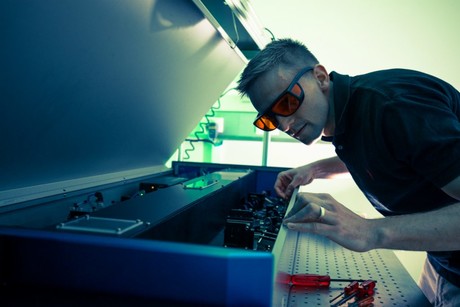2018 Tall Poppies announced for NSW, SA

The Young Tall Poppy Science Awards are on once again, recognising the achievements of outstanding young Australian researchers who are passionate about communicating their research and engaging with the community.
The awards are run in each state and territory by the Australian Institute of Policy and Science (AIPS), with winners announced throughout the year. These award winners (‘Tall Poppies’) participate in education and community outreach programs in which they become role models to inspire school students and the broader community about the possibilities of science.
Last week, 12 Tall Poppies were announced from NSW. They are as follows:
- Dr Melody Ding, from the University of Sydney, was awarded for her work at the intersection of epidemiology, behavioural science and chronic disease prevention.
- Dr Andrew Gardner, from the University of Newcastle, is investigating the long-term effects of sports concussion in retired professional rugby league players.
- Dr Simon Gross, from Macquarie University, is developing special techniques to make precision glass chips that can channel and process light in three dimensions.
- Dr Laura Parker, from the University of Sydney, is a marine scientist who has discovered that oysters can acclimatise to ocean acidification via transgenerational plasticity.
- Dr Jelena Rnjak-Kovacina, from UNSW, is exploring the use of bioengineered tissues, such as cardiac patches, that can replace damaged heart tissue caused by heart attacks.
- Dr Samantha Solon-Biet, from the University of Sydney, has shown that a balance of macronutrients, specifically diets low in protein and high in carbohydrate, extends healthy lifespans in mice.
- Dr Genevieve Steiner, from Western Sydney University, seeks to develop biomarkers to determine which individuals with mild cognitive impairment (MCI) — a transitional stage between healthy ageing and dementia — are most at risk.
- Dr Caragh Threlfall, from the University of Melbourne, is looking at ways to reduce the environmental impacts of urbanisation and develop environmentally based solutions.
- Dr Michelle Tye, from the Black Dog Institute at UNSW, was recognised for her work on improving early detection and prevention of suicide.
- Dr Aliza Werner-Seidler, also from the Black Dog Institute, has designed a new approach for preventing depression — by targeting insomnia via a smartphone app based on cognitive behaviour therapy.
- Dr Kate Umbers, from Western Sydney University, aims to gain a deep understanding of the life history, vulnerabilities and genetic refugia of key animal species in the Australian Alps.
- Dr Sze Lin (Serene) Yoong, from the University of Newcastle, is developing and implementing nutrition guidelines in childcare centres to help address childhood obesity.
The awards come just a few weeks after South Australia announced its own 10 Tall Poppies. They are as follows:
- Dr Catherine Attard, from Flinders University, has used DNA tools to ensure only unrelated individuals are bred in captive breeding programs of endangered species, thereby maintaining genetic health.
- Dr Ryan Balzan, also from Flinders University, focuses on the role that cognitive biases play in the development and maintenance of delusions.
- Dr Melanie MacGregor, from the University of South Australia, has developed a new class of plasma polymer capable of irreversibly binding functional biomolecules.
- Dr Lewis Mitchell, from the University of Adelaide, focuses on mathematical and statistical techniques for understanding how information moves across social networks.
- Dr Rodrigo Praino, from Flinders University, uses a combination of experiments, statistical modelling and real-world data to explain how citizens arrive at their voting decisions.
- Dr Katharina Richter, from the University of Adelaide, has developed two treatments for infections with antibiotic-resistant bacteria and translated both to pilot studies in humans.
- Dr Cameron Shearer, also from the University of Adelaide, has made solar cells with reduced weight and thickness compared to commercial cells, allowing them to be placed in more locations.
- Dr Benjamin Sparkes, also from the University of Adelaide, is developing a device that can boost the maximum distance of quantum cryptography.
- Associate Professor Emma Thomas, from Flinders University, focuses on understanding what motivates people to join collective efforts for causes that can positively and negatively affect people or society.
- Dr Harrier Whiley, also from Flinders University, conducts research on the presence of opportunistic pathogens in potable and re-use water, while also utilising a multifocal approach to tackle emerging food safety issues.
“I congratulate the winners of the 2018 Young Tall Poppy Science Awards and wish you every success in your ongoing research and engagement with the media and wider community,” said AIPS Chair Professor Maria Kavallaris.
“These winners reflect the important, life-changing research being carried out that will ultimately affect all of us. These researchers are shaping the future of health care, our environment and our way of life in ways that we cannot even imagine. Their passion for communicating their work means many more will hear about the fantastic work being carried out right here in Australia.
“These Tall Poppies are already helping to promote a scientifically literate society where we can stimulate engaged discourse about the future of our communities and inspire a new generation of passionate researchers. A more scientifically engaged society is something every scientist should aspire to and the reason that Tall Poppy winners are so important.”
The 2018 Tall Poppies for Queensland, Western Australia, the ACT, Western Australia and Tasmania will be announced later in the year.
Vaxxas appoints former Merck Global Vaccines President David Peacock as CEO
To lead the commercialisation of Vaxxas's proprietary high‑density microarray patch (HD‑MAP)...
Optics11 Life appoints Jacquelien ten Dam as CEO
Optics11 Life plans to accelerate its commercial growth in key markets while building strategic...
Epilepsy pioneer elected President of Aust Academy of Science
Laureate Professor Sam Berkovic — one of the world's most respected neurologists...



